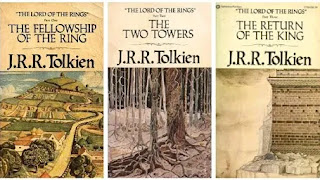Hear me out!
I'm aware, course, that there are many works that we would now call fantasy that predate Lord of the Rings, but the conception of fantasy as a specific genre post-dates those works. The conception of fantasy as a genre grew out of fairy stories, and so what I mean here is a work distinct from fairy tale that nevertheless contains the elements of fairy tales: elves, dwarves, dragons, etc. The works of Howard, Smith, and others would be been thought of as adventure stories, weird tales, and the like when first published.
Even still, there are older works that that meet that criteria: MacDonald's The Princess and the Goblin, some of Baum's works, and Dunsany's. But all the works I can think of that do they aren't obviously children's works have strong elements of whimsy, irony, and often outright humor. Even Tolkien's own The Hobbit could be so characterized. Lord of the Rings, while not humorless, is much more serious business, though perhaps not as much as Anderson's The Broken Sword, which closely follows it.
Did this seriousness play a role in it's centrality to the emerging genre? I think a bit, though it might be easy to overstate the importance of that one factor. I do think that with Howard and Tolkien sort of being the prevailing template for fantasy has served to influence the tone of a lot of works that followed and the games that inspired them.









2 comments:
Would Eddison's Worm Oroboros? count as whimsical? I would say not, and it's strange but serious. Though maybe the childish names and origins of they characters makes it childish. His viking saga, Bjorn the Strong, seems more like serious adventure fantasy.
Similarly some of Rider Haggard's stuff.
Make sense to me. The serious tone probably expanded the audience from children to everyone, though children could still get enjoyment from the books.
Post a Comment